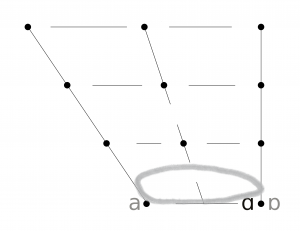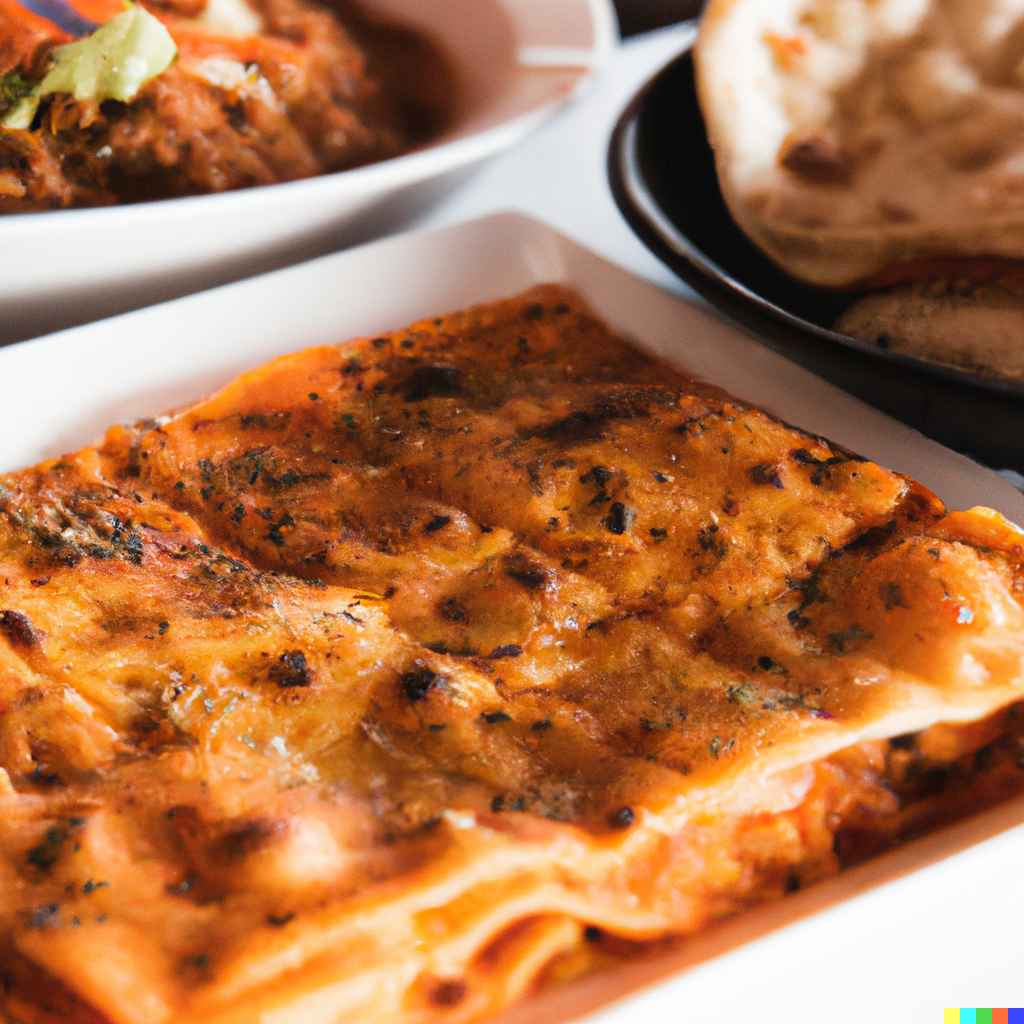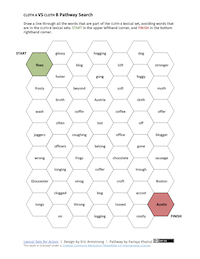11 The PALM Lexical Set

The palm lexical set is one of the smallest sets, with a very limited range of words with the stressed vowel “ah,” or /ɑ/. The vowel in palm is Free, so it can occur with no following consonant as we get in words like bra, spa, and is always stressed in its dictionary form. The palm Lexical Set does not contain the words with this vowel followed by /r/; these words are in start.
As the word palm is sometimes pronounced with a dark, velarized-L [ɫ], this can lead some speakers, especially in North America, to pronounce the keyword for the palm lexical set with the vowel of lot or thought. Some voice, accent, or speech trainers have taken to using alternate keywords—such as “spa” or “father”—in order to avoid this confusion. If you pronounce palm in this manner, it might be helpful to learn to say this palm the keyword as [pɑm] for this purpose. Don’t change your pronunciation of the word in your personal idiolect, try just using this version when you’re saying palm to refer to the Lexical Set.
palm is sometimes merged with the lot and/or thought Lexical Sets, as it is in some North American accents.
- 🕊Free: does not require a following consonant, and can exist on its own
- in stressed syllables, and unstressed ones, too.
Spellings
palm Ⓐ: native Anglo-Saxon words such as father, calm: al, a#[1], ah;
palm Ⓑ & prime: foreign loan words, such as sonata, taco: you must memorize the palm pronunciation for these spellings
There are extremely few words that are of Anglo-Saxon origins that are pronounced with palm; they are grouped together in palm Ⓐ. The majority of palm words are loan words from other languages, such as French, Italian, Hindi, Persian, Japanese, Spanish… the list goes on. These words are, for the most part, in palm Ⓑ. It seems to me that when a loan word is pronounced with the [a] vowel in its language of origin, it is frequently interpreted as belonging to palm, which generally takes [ɑ]; this is especially true in accents of English where there are only “flat a” [æ] and “broad a” [ɑ] options available. For example, Italians say pasta as [pasta], and many accents of English either pronounce it as [ˈpɑstə] or [ˈpæstə].
Frustratingly, there is a subset of palm words that JC Wells dubbed palm’ (that’s pronounced “palm prime”), that are palm in Received Pronunciation, but which fluctuate between palm and bath/trap in General American. For some of these loan words from non-English sources, there is quite a lot of variation, especially if a speaker knows the original language and incorporates the native pronunciation into their usage. For example, think of a (pretentious?) person who pronounces latte as if they were speaking Italian, even though they don’t actually speak Italian. Older Canadian speakers may pronounce many of these words with trap/bath, and though this has almost completely vanished with younger speakers, some words, such as pasta, drama, Mazda, plaza, mafia, may still be pronounced with [æ].
Pronunciations
The palm lexical set is pronounced with an open back vowel, usually completely unrounded. The vowel is often used as the sound one makes at the dentist: “Open your mouth wide and say ‘ah’.” Mostly it’s [ɑ], with variations in the range of [a~a̠~ɑ̟~ɑ] in most of the mainstream accents of English. palm can merge with many sets, and usually when it does, the other set adopts its pronunciation:
- lot, in many accents of North America
- thought, in several rhotic accent of North America
- cloth, especially in Canadian speech
- bath, in RP and many accents of southern England
- start, for all non-rhotic accents.
Many second-language (L2) speakers of English either lack an equivalent back [ɑ] vowel in their first-language (L1) vowel system, and so substitute [a], which they are likely to use for trap/bath as well. Many palm words are loan words from other languages: if those words are also loan words in the their L1, they may use those pronunciations when speaking English.
Personal Pronunciation
Let’s take a moment to investigate your personal pronunciation of palm. Experiment on your own with an audio recorder, or with a classmate, friend, coach or teacher to identify how palm in your speech compares with palm in others’ speech. Try lengthening the sound of your palm vowel, and then attempt to subtly shift it around in the vowel space—up, forwards, down, and back—in tiny increments. As it is a fully open back vowel, as you experiment you should feel the top surface of the back of your tongue moving delicately up and down, towards/away from your soft palate and uvula, making more or less space in the back of your mouth. Take it to the extreme as well, making the most open/back sound possible, so that the back of your mouth is as wide open and spacious as possible. palm should have no lip rounding, though some speakers find that they have a few words with variant pronunciations (usually merged with lot or thought with a little lip rounding) and a word like pa, spa, father. Compare palm with trap or bath, and see how great the contrast is between the vowels.
Decide which vowel symbol best suits your palm Lexical Set. Is it more forward [a] or further back, [ɑ]?
If your palm vowel is… (use whichever vowel symbol is appropriate for you)
- high, use the raised diacritic [ ɑ̝ ], a small T pointing up
- open, use the lowered diacritic [ ɑ̞ ], a small T pointing down
- pushed forward, use the advanced diacritic [ ɑ̟ ], a tiny plus sign +
- pulled back, use the retracted diacritic [ ɑ̠ ], a tiny minus sign –
- if you add lip-rounding, use the more rounded diacritic [ ɑ̹ ], a tiny ɔ, which represents the lips rounding/projecting forward (to the left),
- if you have no lip-rounding, especially on a symbol assumed to be rounded like [ɒ, ɔ, o], us the less rounded diacritic [ ɑ̜ ], a tiny c, which represents the lips relaxing/moving back (to the right).
Alternate Pronunciations
Experiment with the palm Word Lists, Phrases and Sentences with the following vowels:
As you move the vowels in the directions recommended, see whether that modified oral posture might inspire you to move the articulation of consonants and other vowels in the word in similar ways. Does it remind you of an accent other than your own?
Word Lists, followed by a pause, or by another vowel
KEY: palm Ⓐ: native English words, palm Ⓑ & prime: foreign loan words
◾︎ palm in stressed syllable ◽︎ palm in unstressed syllable
Word Lists for palm, sorted by the consonant that follows
KEY: palm Ⓐ◾ native English words, palm Ⓑ & prime: foreign loan words
◾︎ palm in stressed syllable ◽︎ palm in unstressed syllable
PLOSIVES
-p
-b
-t
-d
-k
-ɡ
AFFRICATES
-tʃ
-dʒ
NASALS
-m
-n
-ŋ
FRICATIVES
-θ
-ð
-f
-v
-s
-z
-ʃ
-ʒ
For palm followed by /-r/, see start.
palm before /l/ can be affected by the following consonant; the vowel is often pulled back, especially if /l/ is articulated with the dark-l [ɫ], which may move the vowel more towards [ɒ] which is often the sound of lot, (especially if it is distinct from palm).
-ɹ
-l/ɫ
-w
Short Phrases
- Nicki Minaj and Kanye West
- Naan with dhal, not lasagna.
- The tsunami in Java.
- Barack Obama killed Osama bin Laden.
- Gaga danced the cha-cha and the samba.
- The chorale sang Mahler.
- Did Sinatra have ties to the Mafia?
- Learn Laban technique at RADA.
- The Wagner sonata was played “vivace.”
- Anna* spoke Gujarati, Marathi and Malaˈyalam.
- Zsa Zsa’s entourage.
- Ashkenazis in Gaza.
- Malala is from Pakistan*.
- Teriyaki chicken with wasabi, not guacamole.
- Origami from Yokohama and Osaka.

Sentences
Level 1
Short with 2-3 words, underlined
- My father-in-law lives in Guam.
- She flew from Islamabad to Vietnam.
- They drove their Impala to the garage.
- Natasha* smoke marijuana in the plaza.
- Is the seraglio* near the Haˈgia Sophia?
Level 2
Short with 4-5 words, underlined
- The Nazi’s ɡift of a red corsage showed he was with the Gestapo.
- Where is the hijab* more popular: in Sumatra, Abu Dhabi, or Karachi?
- Muhammed Ali put the lip balm in the palm of her hand.
- Papa met Gore Vidal and Roald Dahl in Bali.
- The drama at the spa featured a virago meeting a Lothario.
Level 3
Medium with 3-4 words, not underlined
- I’ll have a pina colada with my nachos, with extra avocado in the guacamole!
- Kamala got a new Prada bag for her visit to Colorado* and Nevada*.
- Test the Yahama piano by playing legato, staccato, both forte and piano*.
- Mahatma Gandhi is not a hero in Malawi, in spite of what happened to him in KwaZulu Naˈtal.
- She drove her Maserati from Lake Tahoe for Mardi Gras.
Level 4
Hard with 4-6 words, not underlined
- Nadia’s mama had her study Picasso’s panorama on Khan Academy.
- Inspector Lestrade sipped his lager while Holmes calmly examined the broken vase.
- Shah Jahan, who built the Taj Mahal in Agra, was born in Lahore, Pakistan.
- The ship Esmeralda, one of Vasco da Gama’s armada, was found off the coast of Oman.
- The coup d’etat against Robert Mugabe was announced in the plaza in Harare, Zimbabwe.
Mergers
palm–lot Merger: Also known as the “father-bother merger,” where lot merges with palm. This is found in African American English and many forms of Southern US English, and in the speech of County Cork and County Kerry in Ireland. Examples of Father-Bother homophones: Mach/mock, bomb/balm*, comms/calms*, doll/dal*, pompom/palm. If you have this merger, then try to differentiate the lot and palm words in this sentence; if you do not have it, try to match them! Experiment with lot/palm pairs such as [ɒ/ɑ, a/ɑ, ɒ̝/ɒ̞, ɔ̞/ɑ, ɑ̟/ɑ̠ ].
-
- If Bollywood made a movie in Bali, would James Caan play a con man in it?
- Commonly, an Imam’s job in Islam lead prayers and sermons, called Khutbah.
- Amaan owns a popular shop in Pakistan that sells the best nihari.
- Leo made an objective to learn an impossible piano sonata to impress their crush, Kamala.
palm–start Merger: For much of the non-rhotic English speaking world, palm and start are merged. As palm is an extremely small lexical set, and start is a much larger set, non-rhotic speakers frequently associate the /ɑ/ vowel with start primarily. Minimal palm/start Pair/homophones include: balmy/barmy, calmer/karma, lava/larva, Kali/Karley, father/farther, mach/mark, baba/barber, spa/spar, fa/far, Masha/Marsha, car key/khaki*, Bach*/bark, Mako/Marco.
-
- My father went farther to get his than the barber who bought one on AliBaba.com.
- I found the car keys in my khakis, and drove Mark’s Bugati at mach one to get Marco the mako shark.
- As a farmer in Guam, the worst thing to hear is the tsunami alarm.
- I feel very macho sorting the airplane cargo in the departure hall in Chicago Airport.
- The taco cart at the park had remarkable guacamole and the crispiest nachos.
The palm–bath Merger is found in the South of England and (to some degree) in some accents of India, Australia, New Zealand and South Africa. In many of these mostly non-rhotic regions, palm–bath then also merge with start. In some of these regions, bath Ⓑ is “split” off, and merged with trap, while the remainder (bath Ⓐ and Ⓒ) are merged with palm. While there were very few minimal or near-minimal pairs for trap–bath, there are almost none for palm–bath, apart from father/rather. At a stretch (?): (tabula) rasa/raspberry, casa/class, kava/cadaver, naan/banana.
- If you have the palm–bath merger, differentiate them in the following sentences: [ɑ̟/æ, ɑ̠/a, ɒ/ɐ̞, ɑ/ɛ, a/ɛ̠ə̯, ɑ̟/eə̯].
- If you don’t have the merger, try to make them match using either your person palm vowel, or one that is new to you: [a, a̠, ɑ̟, ɑ, ɒ].
-
- Mama laughed at Papa as he played basketball in his sandalst and bathrobe.
- Cassiet’s class painted their crafts with gouache in the style of Picasso.
- The basso, alto and soprano felt the tenor’s vibrato was too fast on the last note of the cantata.
- After the palm tree, the road branches off to get to Cary Grant’s old Colorado ranch.
- The façade of the working-class bar was plastered with posters for Lady Gaga.
- My podcast about tacos and guacamole passed half a million downloads this afternoon.
- The nasty Shah said we shan’t eat ramen; rather we must eat Italian pasta*, and if it’s past midnight, we can’t have nachos*.
trap–palm Merger: In Scottish English, palm is merged with trap, with both pronounced in the range of a centralized [ä]; another way to transcribe this sound is [a̠]. Examples of this merger can be observed in the following minimal pairs, which are homophones: back/Bach*, Sam/psalm, rally/Raleigh, Mac/Mach, Pam/palm, cam/calm, bat/baht, Basil/Basel, can/khan. Try differentiating trap from palm by using [æ/ɑ, eə̯/a, a/ɒ], if you have this merger in your own speech. If you don’t have the merger, try making them match; can you find a comfortable vowel for this, in the range of [æ, a, a̠, ɑ̟, ɑ]?
- Cam was calm while Sam said a psalm as they rode their Raleigh tandem bicycle in the rally.
- As a blood nurse, my father gathers donations for plasma at the plaza.
- Sasha has a passion for international brands of pistachio nuts.
- Mick’s garage* was full of magical gadgets, including one you can use to camouflage things.
Note that English has a large vowel inventory (with ~20 vowels and diphthongs) compared to many of the world’s languages, which can have as few as 3 vowels! L2 speakers from languages with small vowel inventories (e.g. 5-6 vowels) often merge palm and trap, too. Spanish, Japanese and Italian all have only one “a” vowel. So this distinction can be unfamiliar for many L2 speakers.
The trap–bath–palm Merger, found in Scotland and parts of Northern Ireland, merges all three ‹a› vowels into a single group, in or around [a ~ ɐ]. There are no minimal triplets for these merged sounds, though the rhyming gather/rather/father is as close as you’re going to get! If you have this merger, you can use sentences 1–12 above to practice avoiding the merger; if you don’t have the merger, try making all the trap–bath–palm words in sentences 1–12 match using any of these options: [a, a̠, ɐ̞, ɐ, ɑ̟].
-
- My father made a travel plans to Yokohama to visit my aunt in the last week July.
- This afternoon, Nadia built a panda sanctuary on Minecraft Java Edition.
- The soprano jazz singer demanded half of the solos as she claimed to have the best vibrato.
Splits
Silent ‹l› Split: As palm is such a small lexical set, it’s hard to believe there might be further splits than the groups Wells already describes with palm Ⓐ and Ⓑ, as well as palm prime. However, it is worth noting that for many speakers the “silent ‹l›” words, alms, balm, calm, palm, psalm do make their own kind of “Split,” as many in North America pronounce the /l/, or have the vowel affected by its presence to the degree that it shifts toward thought. So, in a way, these words are split off from palm! Seems rather ironic, doesn’t it, that the word used for the Lexical Set is split off from its group for a fairly large portion of the English speaking world? Though there aren’t minimal pairs with homophones possible in this situation, we can make word “pairings:”
Papa/palm, basso/balm, ah/alms, casa/calm, saga/psalm, Amish/almond.
Explore the contrast with these word pairings, by first making them match (leave out the /l/, and keep the vowel quality the same), and then make them distinct by inserting the /l/, and letting the vowel quality in those words be “pulled back”.
Explore vowel qualities different from your own with [a̟, a, a̠, ɑ̟, ɑ, ɑ̠].
Then contrast those with these pairings: [a̟/a, a/ɑ̟, a̠/ɑ, ɑ̟/ɑ̠, ɑ/ɒ, ɑ̠/ɔ].
If you have this “split,” how would you transcribe your version?
Review
Pathway Puzzles
 Pathway Puzzles allow you to practice finding members of a lexical set. Choose the next cell with the FIRST lexical set word to make a pathway from the START of the puzzle down to the FINISH. Open the KEY document to see the solution, and check your work. Pathway Puzzles were created by Farisya Khairul, through support from a AMPD Minor Research Grant.
Pathway Puzzles allow you to practice finding members of a lexical set. Choose the next cell with the FIRST lexical set word to make a pathway from the START of the puzzle down to the FINISH. Open the KEY document to see the solution, and check your work. Pathway Puzzles were created by Farisya Khairul, through support from a AMPD Minor Research Grant.
- # in phonology means a word boundary, or, in this case, the end of the word. ↵

